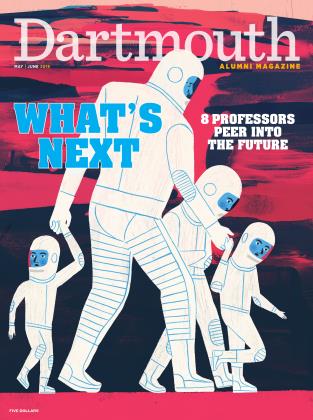EUREKA!
CAMPUS
[NEW FINDINGS AND RESEARCH]
Election Forecast
Rain affects the outcome.
Bad weather on election day is good news for Republicans, according to both on-the-ground observations at polls and scientific studies of voting data. A new analysis in American Politics Research by government professor Yusaku Horiuchi shows that besides keeping potential Democratic supporters from getting to the polls, rain and snow may actually cause voters to favor Republican candidates. Horiuchi revisited U.S. presidential election data from 1948 to 2000 and examined meteorological records that show Republicans gain a 1-percent bump when it rains, while Democrats capture 2.1 percent less of the electorate. “Inclement weather on election day could affect voters’ moods and risk attitudes, which opens the possibility that weather conditions affect voters’ electoral choices as well,” writes Horiuchi. The paper concludes with a call for further analysis of weather’s impact on individual voting preferences based on post-election surveys.
Blind Justice?
Sentencing software is overrated.
Algorithms believed to predict recidivism are becoming increasingly popular with American judges, who use software programs such as COMPAS to assist in parole and sentencing decisions. However, a new study by Julia Dressel ’17 and computer science professor Hany Farid in Science Advances shows that COM PAS is no more accurate than predictions made by a randomly selected group of individuals with little to no background in criminal justice. The researchers also found they could match the 65-percent accuracy rate of COM PAS predictions with two pieces of data: age and past convictions. “If you are young and have a lot of prior convictions, you are high-risk,” says Farid. “It’s kind of obvious.” The duo notes that it’s not against using algorithms to predict recidivism. They want to show that the software is no more accurate or unbiased than humans.
 View Full Issue
View Full Issue
More From This Issue
-
 Cover Story
Cover StoryWhat’s Next
MAY | JUNE 2018 By TIFFANIE WEN -
 Feature
FeatureOut of This World
MAY | JUNE 2018 By MARK NELSON '68 -
 Feature
FeatureOut of the Amazon
MAY | JUNE 2018 By ANDREW FAUGHT -
 YOUR TURN
YOUR TURNYOUR TURN
MAY | JUNE 2018 -
 OUTSIDE
OUTSIDEAt the Mercy of the Mountain
MAY | JUNE 2018 By LANCE TAPLEY ’66 -
 INTERVIEW
INTERVIEW“Take the Right Risks”
MAY | JUNE 2018 By BETSY VERECKEY
Notebook
-
 notebook
notebookIncentivized Opinions
JANUARY | FEBRUARY 2018 -
 notebook
notebookNEWS AND NOTES
MARCH | APRIL 2018 -
 notebook
notebookASK THE EXPERT Why Mars Matters
MAY | JUNE 2021 -
 notebook
notebookEUREKA !
JANUARY | FEBRUARY 2022 -
 notebook
notebook“The Sensorial Experience”
NOVEMBER | DECEMBER 2019 By KERMIT PATTISON -
 notebook
notebookThe Things He Carries
JANUARY | FEBRUARY 2020 By Svati Kirsten Narula ’13

